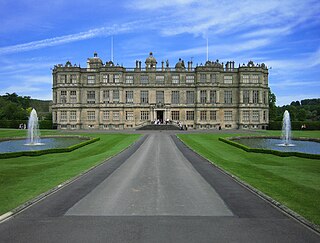
Joseph Blagrave (1610–1682) was an English astrologer.

Joseph Blagrave (1610–1682) was an English astrologer.
Little is known of Blagrave's life. He was born in Reading, Berkshire in 1610, the youngest of four sons of Alexander and Margaret Blagrave, of a branch of that family of Calcot Park near Reading; [1] he was a nephew of the mathematician John Blagrave, from whom he is thought to have inherited a small estate in nearby Swallowfield. [2] [3]
He and his wife Susan had a son Joseph in May 1640; Susan died shortly afterwards, on 2 June. [3]
In the article in the Dictionary of National Biography, Charles Henry Coote wrote "His character appears to have been a curious mixture of earnest piety with a profound belief in the virtues of astrology".


William Lilly was a seventeenth century English astrologer. He is described as having been a genius at something "that modern mainstream opinion has since decided cannot be done at all" having developed his stature as the most important astrologer in England through his social and political connections as well as going on to have an indelible impact on the future course of Western astrological tradition.

Lieutenant-General James FitzThomas Butler, 1st Duke of Ormond, KG, PC (1610–1688), was an Irish statesman and soldier, known as Earl of Ormond from 1634 to 1642 and Marquess of Ormond from 1642 to 1661. Following the failure of the senior line of the Butler family, he was the second representative of the Kilcash branch to inherit the earldom.

Marquess of Bath is a title in the Peerage of Great Britain. It was created in 1789 for Thomas Thynne, 3rd Viscount Weymouth. The Marquess holds the subsidiary titles Baron Thynne, of Warminster in the County of Wiltshire, and Viscount Weymouth, both created in 1682 in the Peerage of England. He is also a baronet in the Baronetage of England.

John Blagrave of Reading was an English Tudor mathematician, astronomer and designer of astronomical and mathematical instruments. His astrolabe designs, which he described in his writings, were advanced for Britain. He devoted himself to mathematical study and was called, by Anthony à Wood, "the flower of mathematicians of his age"
Daniel Blagrave (1603–1668) was a prominent resident of the town of Reading, in the English county of Berkshire. He was Member of Parliament for the Parliamentary Borough of Reading over several periods between 1640 and 1660, and was also one of the signatories of King Charles I's death warrant.
The High Sheriff of Monaghan was the British monarch's representative in County Monaghan, a territory known as his bailiwick. Selected from three nominated people, he held his office over the duration of a year. He had judicial, ceremonial and administrative functions and executed High Court Writs.

Henry Boyle, 1st Earl of Shannon, PC (Ire) was a prominent Irish politician.

Thomas Thynne was an English landowner of the family that is now headed by the Marquess of Bath and politician who sat in the House of Commons from 1670 to 1682. He went by the nickname "Tom of Ten Thousand" due to his great wealth. He was a friend of the Duke of Monmouth, a relationship referred to in John Dryden's satirical work Absalom and Achitophel where Thynne is described as "Issachar, his wealthy western friend".

Charles Coote, 1st Earl of Mountrath was an Anglo-Irish peer, the son of Sir Charles Coote, 1st Baronet, and Dorothea Cuffe, the former being an English veteran of the Battle of Kinsale (1601) who subsequently settled in Ireland.
Edward Sheldon was an English translator of four Catholic works. Two of them appeared in the troublesome period of the Stuart Restoration.

Sir Henry Blount (1602–1682) was a 17th-century English landowner, traveller and author.
John Brinsley the Elder was an English schoolmaster, known for his educational works.
The Lord President of Connaught was a military leader with wide-ranging powers, reaching into the civil sphere, in the English government of Connaught in Ireland, in the sixteenth and seventeenth centuries. The office was created in 1569, and in 1604 was reconstituted with full powers to hear all civil suits, to impose martial law and to proceed with "fire and sword" against the King's enemies. The width of his powers gave rise to clashes with the longer established courts: in 1622 he and the Lord President of Munster were ordered not to "intermeddle' in cases which were properly within the remit of those courts. He was assisted by a council whose members included the Chief Justice of Connacht, one or two associate justices and the Attorney General for the Province of Connacht. The office was abolished in 1672.
William Andrews was an astrologer, known mostly from his books, which were published from 1656 to 1683. The first of these is the Astrological Physician of 1656, to which William Lilly contributed a preface. Among the Ashmolean Museum's manuscripts, there is preserved a letter, dated from Ashdown, Essex, 31 March 1656, in which Andrews thanks Lilly for writing the preface. In 1672 he published Annus Prodigiosus, or the Wonderful Year 1672, and More News from Heaven unto the World, or the Latter Part of the Wonderful Year 1672; being a further Account of the Portents and Signification of the Stars touching the United Netherlands. His last work was An Almanack for 1683.

John Case (c.1660–1700) was an English astrologer and quack doctor, a writer on anatomy, astrology and medicine.

Sir James Thynne was an English landowner and politician who sat in the House of Commons in two periods between 1640 and 1670.

David Clarkson was an English ejected minister.
William Thynne was an English courtier and editor of Geoffrey Chaucer's works.

Henry Coley was an astrologer and mathematician, and amanuensis of William Lilly.
Attribution